Gajar Halwa (Carrot Halwa)
Gajar Halwa is a quintessential Indian dessert made with carrots, ghee, milk, sugar and flavored with cardamom. It's rich, creamy and do decadent!
This post may contain affiliate links. Please read our disclosure policy.
Classic Indian dessert Gajar Halwa is made with carrots, milk, sugar and ghee!
It’s one of quintessential winter dessert especially in North India and is rich and decadent.
You guys! After 9+ years of living in the US, I finally found red carrots here! I almost can’t believe it.
Remember how much I cry over orange carrots while making carrot halwa? Well, not anymore because I found the real deal! Seriously, I got over 4 kilograms of red carrots and even the cashier was like “what would you do with so many carrots”? lol.
It’s such a Delhi thing right, if you grew up in and around Delhi eating that gajar halwa made with winter red carrots, you can’t possibly ever enjoy the halwa made with orange carrots. It’s just no match!
The red carrots are so much sweeter, have a flavor of their own and that’s what makes them perfect for the halwa.
I remember being served gajar halwa (or gajrela as it’s also known in Punjabi) whenever I went to anyone’s house during winters. It’s like everyone in Delhi and around makes this during that time of the year.
At my home, the halwa making process took hours. First of all, it was made with at least 3-5 kilograms of carrots and then those carrots were cooked in milk until the milk was completely reduced.
That process really took the whole day, I of course didn’t do anything other than eating it. But now that I made 3 kilograms halwa the other day, I realized that how much effort goes behind it.
I always liked the gajar halwa that was made in my house, I was never a fan of the halwa that was made in mithai/sweet shops. They were mostly loaded with khoya (dried solids) but always lacked the real taste.
After I got married, I also loved the halwa my mother-in-law made. After asking about the recipe, it turned out my mom and mother-in-law made the halwa in exactly the same way. So, I am sharing exactly the same recipe here.
Although this gajar halwa recipe might seem long and time consuming, it’s totally worth it. Also you kind of make this only once a year, so I feel it’s worth the effort. There’s a lot of hand work in this recipe so makes for a good arm workout ;)!
However, if you are looking for an easier recipe, then check out the instant pot gajar halwa recipe that I had shared some time back. That’s less time consuming.
But if you have the time, I highly recommend making it this way. It’s just the best!
How To Make the Perfect Gajar Halwa
Use red carrots: for people in India, it is obviously no brainer. You get nice fresh winter red carrots and that’s what makes the best halwa.
For people in US, I know red carrots are hard to find but look at farmer’s market during the last week of January. You might be able to find them. Please use red carrots for the halwa if you can.
Grate the carrots by hand: I for one do not like using food processor for the halwa. The processor usually turns them carrots into a mush and that in turns has an effect on the final texture of the halwa.
The hand grater that I have has two sides, grate using the bigger side (with bigger holes), you don’t want the carrots very thick and you don’t want them extra thin too.
Use whole milk: for best results, cook in whole milk. For this recipe, we first reduce the milk first to half and then add the carrots and then cook until all the milk reduces and coverts into milk solids.
You can use skimmed milk but since it has low fat, the solids won’t be enough and it’s won’t be as rich in taste.
Don’t take shortcuts: I love taking shortcuts when possible, but for this halwa which I make like once a year, I like sticking to the traditional recipe.
I grate the carrots by hand and then cook in milk until it’s reduced. Don’t use evaporated milk or condensed milk to cut short the process here for that authentic taste.
Roast in ghee: the final bit of roasting the halwa in ghee adds a lot of flavor. It also adds a nice shine to the halwa and make it look bright red.
So definitely don’t skip on that.
Optional- add mawa/milk powder for richer taste: I don’t add any of these since my mom never added them and that’s how it was made in my house. But adding khoya or milk powder will make it richer.
Ingredients
My mom said that we only need 3 basic ingredients for making gajar halwa- red carrots, sugar and milk.
Everything else including ghee was optional. I do use ghee, nuts and cardamom though for added flavor though but mom did make halwa without ghee a lot of times and it still tasted great.
Carrots: I cannot stress enough how a good gajar halwa needs red carrots. I totally understand that you can’t find them in the US (I just got lucky this year) but if you can, you must taste the halwa made with red carrots.
You will never come back to the orange ones, I can guarantee that.
Milk: you need whole milk for this recipe. It makes the halwa richer and adds tastier.
Since we cook the milk until solids remain, you definitely should use whole milk as it has more fat.
For 1 kg of carrot, the amount of milk can be anywhere between 1 liter to 1.5 liters. My mom used 1 liter and my mother-in-law uses 1.5 liters. Both versions don’t have much difference except the one with 1.5 liters will form more milk solids. They taste also same.
Sugar: I have used granulated white sugar here. Red carrots have a natural sweetness, so the amount of sugar can vary to taste.
For 1 kg carrots, you can add anywhere between 1 cup to 1.5 cups sugar (200 grams to 300 grams). It really depends on taste, 200 grams is on the lighter side, I prefer somewhere in between.
Ghee: as I mentioned my mom sometime made this halwa without ghee and it was still very good. But ghee adds to flavor and make it tastier. I definitely recommend adding little ghee to the halwa and roasting it in ghee for few minutes.
You can always cut down on the quantity and use very little of it but do use. On the other hand, you can also add couple of tablespoons extra if that’s what you prefer.
Cardamom: adds a wonderful aroma to the halwa. I like grinding fresh cardamom powder using my spice grinder, it’s just so much better that way.
But you can use store-bought cardamom powder.
Nuts & Raisins: I always love my halwa with lots of nuts and raisins. But I know a lot of people who don’t like them, so it’s optional. I love adding cashews, almonds, golden raisins.
You can add all or none, it’s all optional.
Frequently Asked Questions
How much mawa can I use in the recipe?
If you want, you can add around 1/4 cup of crumbled khoya/mawa (or even more) to the halwa at the last step.
Can I skip on the ghee?
I wouldn’t recommend it. Please use at least 1 tablespoon of ghee at the end, it adds to taste and brings out that nice bright red color.
Can we make this in the Instant Pot?
Not the same recipe, but I have a different Instant Pot Gajar Halwa recipe that you can check out! 🙂
How to serve the halwa?
I love eating this halwa warm so I always heat it up in a microwave before serving. But some people also like it cold.
You can serve it with some vanilla ice cream on top, it’s so good!
Can this recipe be doubled?
Yes, I have doubled this recipe easily. Everything doubles, including the time! Since there is much more milk, it takes double the time to reduce. I made 3 kilograms halwa and it took me around 2.5 to 3 hours!
Method
1- Peel and grate the carrots using a hand grater (use the thicker side of the grater). Add the grated carrots to a pan and turn heat to medium-high.
2- Stirring often, sauté the carrots for around 10 minutes until all the moisture dries out. Note: we do not add any ghee or anything here, just dry roasting the carrot to remove the moisture.
You will notice that the color of the carrot will change from red to orange at this point, that’s fine. Remove pan from heat and set it aside.
3- To a heavy bottom pan, add milk. Please do use a heavy bottom pan here otherwise you will have trouble and the milk might burn. You can start this process of boiling the milk on the side when you are sautéing the carrots.
With heat on medium-high, stir the milk often and let it come to a boil. I have used 1.25 liter (1250 ml) of milk here for 1 kg carrots, you can use anywhere between 1-1.5 liters.
4- Once the milk comes to a boil, lower the heat to medium and let the milk boil and reduce until it reduces to at least half or a little bit more than half. Remember to stir very often else milk might get stuck to the bottom of the pan and burn.
5- Meanwhile, fry cashews in 1 tablespoon of ghee until they turn golden brown in color and set aside.
6- Back to the milk, after around 30-35 minutes, the milk will reduce to less than half (this is for 1-1.25 liters, if using 1.5 liters it will take little more time). At the point add the grated carrots and stir. I like to scrape the sides of the pot (which has that malai/thickened milk stuck to it) and mix it with the halwa.
7- Now after this point you have to be extra careful and not leave the halwa unattended. Keep stirring the halwa often on medium heat and cook until all the milk is absorbed by the halwa and it reduces to milk solids.
You will see small particles of milk solids in the halwa. This will take anywhere between 10-20 minutes.
8- At this point add in the sugar.
9- The amount of sugar is to taste, if you like less sweet add 1 cup (200 grams) of granulated white sugar, if you like really sweet add 1.5 cups (300 grams). I usually prefer it in between and add 250 grams.
10- Once you mix in the sugar, the sugar will melt and the halwa will become very liquid-y again.
11- Continue to cook the halwa, stirring constantly until the sugar liquid is all soaked up, this can take 15 minutes or so. Yeah this recipe is excellent hand work-out! Don’t let the halwa dry out a lot since it will continue to thicken as it cools down.
Once that’s done, then add the cardamom powder and the 2 tablespoons of ghee (or more if you want) and roast for 3-4 minutes.
12- Add in the nuts, give a final stir and done.
Serve gajar halwa warm!
If you’ve tried this Gajar Halwa Recipe then don’t forget to rate the recipe! You can also follow me on Facebook, Instagram to see what’s latest in my kitchen!
This post has been updated from the recipe archives, first published in January 2015.
Gajar Halwa
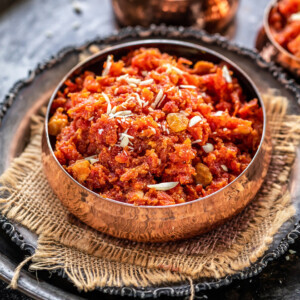
Ingredients
- 1 kilogram red carrots grated, around 15-16 medium size carrots
- 1.25 liters whole milk around 5 cups
- 3 tablespoons ghee 45 ml, divided
- 1-1.5 cups granulated white sugar 200-300 grams, adjust to taste
- 3/4 teaspoon cardamom powder
- 2 tablespoon chopped cashews raw
Instructions
- Peel and grate the carrots using a hand grater (use the thicker side of the grater). Add the grated carrots to a pan and turn heat to medium-high.Stirring often, sauté the carrots for around 10 minutes until all the moisture dries out. Note: we do not add any ghee or anything here, just dry roasting the carrot to remove the moisture.You will notice that the color of the carrot will change from red to orange at this point, that's fine. Remove pan from heat and set it aside.
- To a heavy bottom pan, add milk. Please do use a heavy bottom pan here otherwise you will have trouble and the milk might burn. You can start this process of boiling the milk on the side when you are sautéing the carrots. With heat on medium-high, stir the milk often and let it come to a boil. I have used 1.25 liter (1250 ml) of milk here for 1 kg carrots, you can use anywhere between 1-1.5 liters. Once the milk comes to a boil, lower the heat to medium and let the milk boil and reduce until it reduces to at least half or a little bit more than half. Remember to stir very often else milk might get stuck to the bottom of the pan and burn.
- Meanwhile, fry cashews in 1 tablespoon of ghee until they turn golden brown in color and set aside.
- Back to the milk, after around 30-35 minutes, the milk will reduce to less than half (this is for 1-1.25 liters, if using 1.5 liters it will take little more time). Please remember to stir the milk very often when it's reducing. At the point add the grated carrots and stir. I like to scrape the sides of the pot (which has that malai/thickened milk stuck to it) and mix it with the halwa.
- Now after this point you have to be extra careful and not leave the halwa unattended. Keep stirring the halwa often on medium heat and cook until all the milk is absorbed by the halwa and it reduces to milk soilds.You will see small particles of milk solids in the halwa. This will take anywhere between 10-20 minutes.
- At this point add in the sugar. The amount of sugar is to taste, if you like less sweet add 1 cup (200 grams) of granulated white sugar, if you like really sweet add 1.5 cups (300 grams). I usually prefer it in between and add 250 grams.
- Once you mix in the sugar, the sugar will melt and the halwa will become very liquid-y again.
- Continue to cook the halwa, stirring constantly until the sugar liquid is all soaked up, this can take 15 minutes or so. Yeah this recipe is excellent hand work-out! Don't let the halwa dry out a lot since it will continue to thicken as it cools down.Once that's done, then add the cardamom powder and the remaining 2 tablespoons of ghee (or more if you want) and roast for 3-4 minutes.
- Add in the nuts, give a final stir and done. Serve gajar halwa warm!
Notes
- You can add khoya or milk powder at the end to make the halwa richer.
- Other than cashews, you can aslo add almonds, golden raisins to the halwa.
Nutrition
Nutrition information is automatically calculated, so should only be used as an approximation.
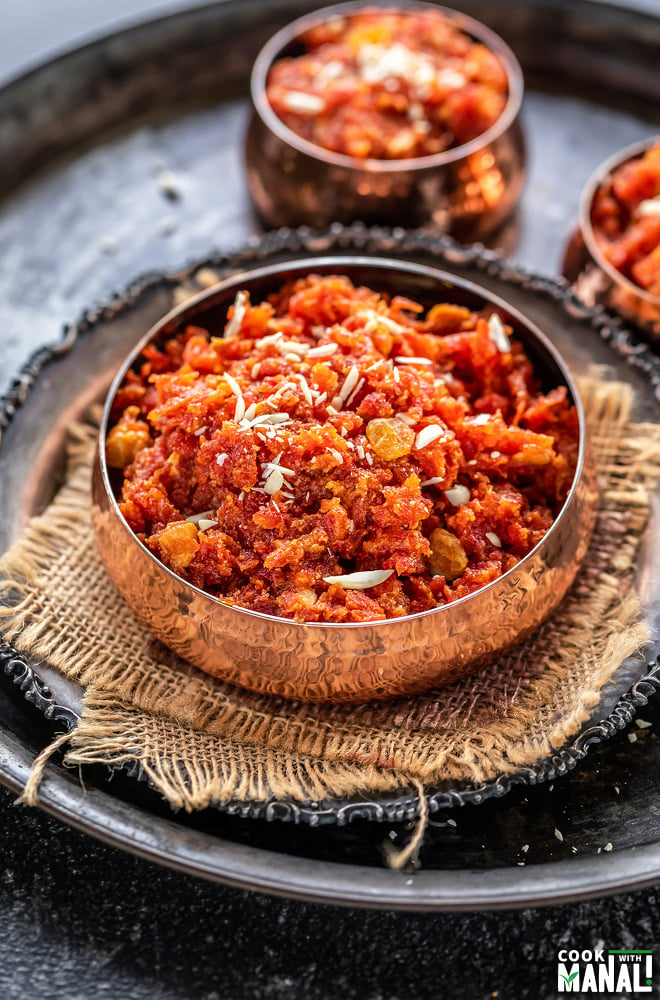
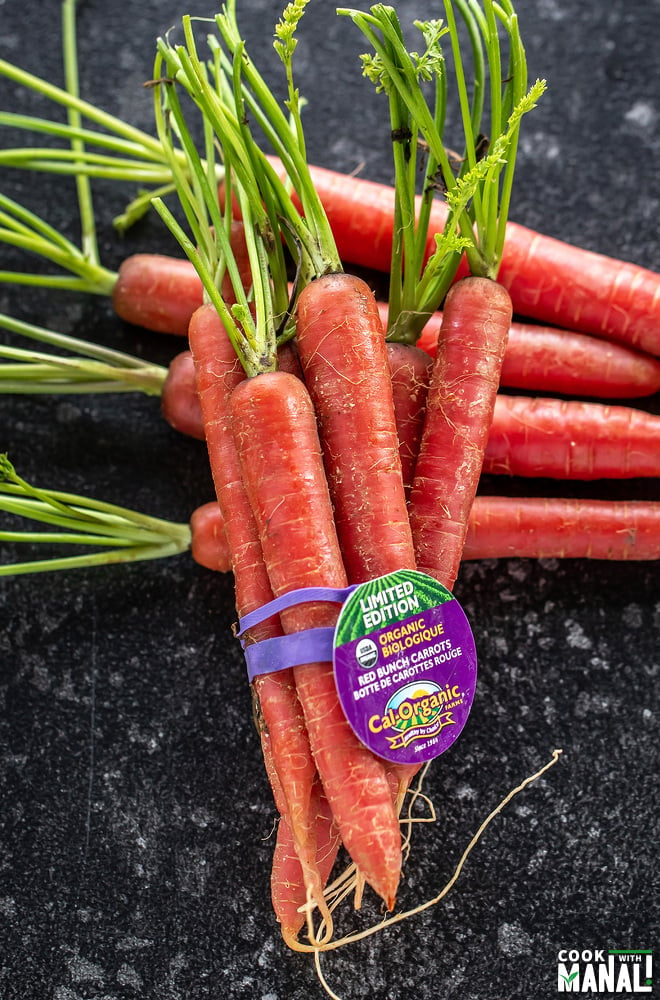
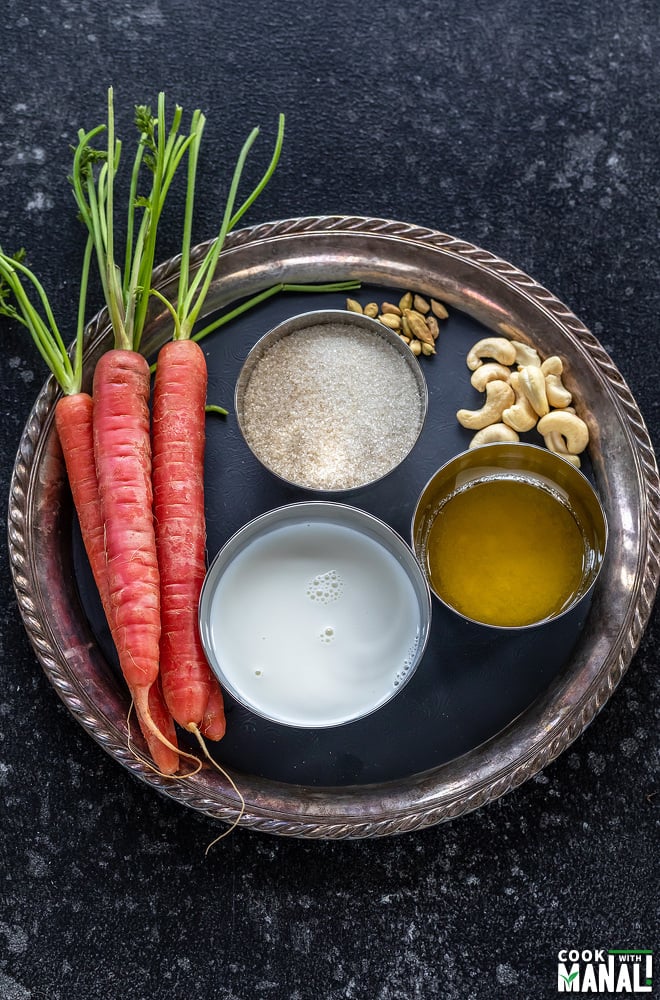
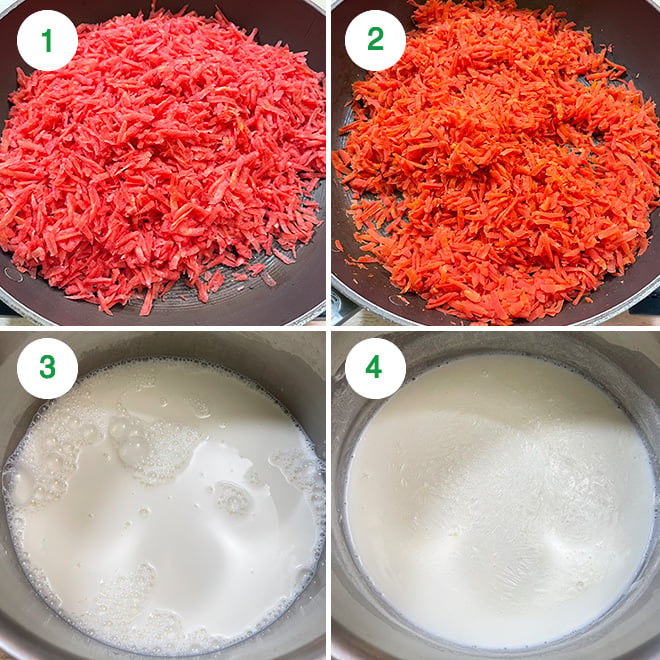
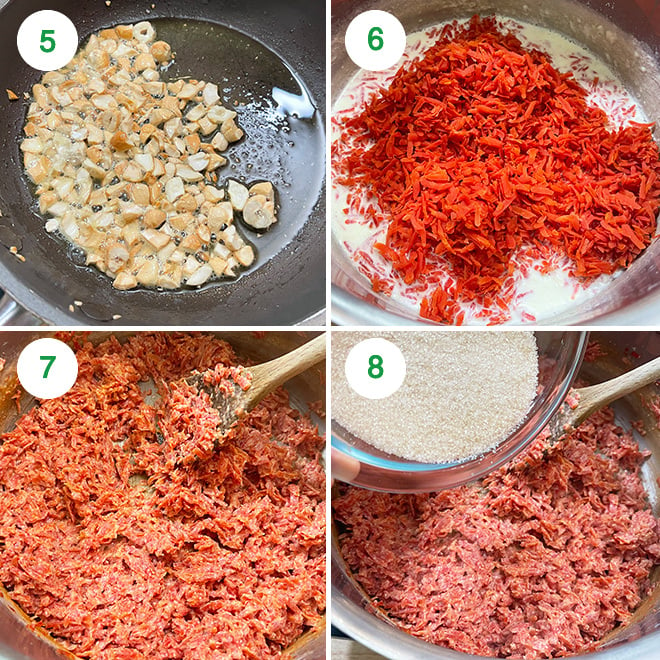
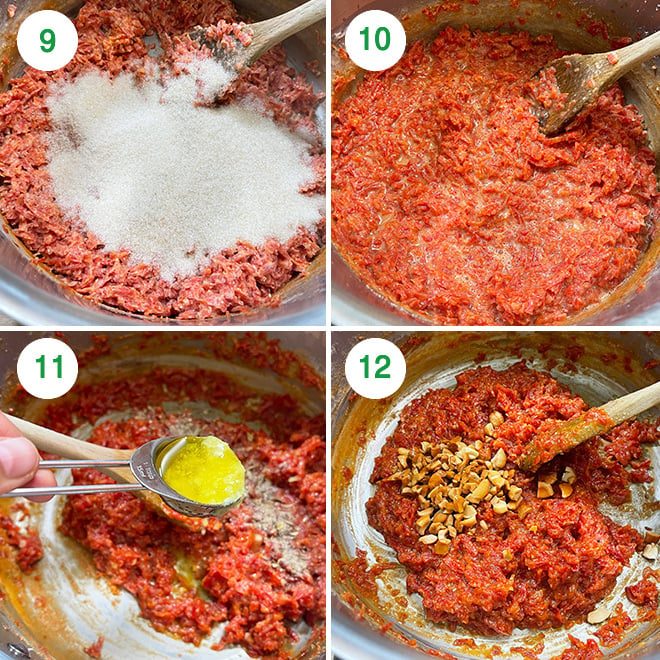
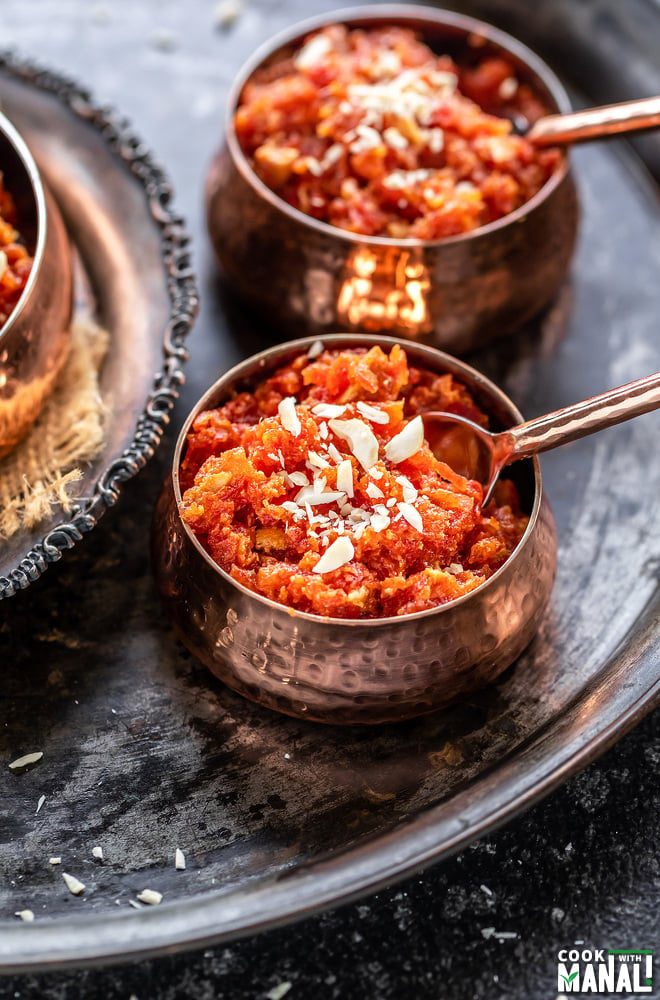
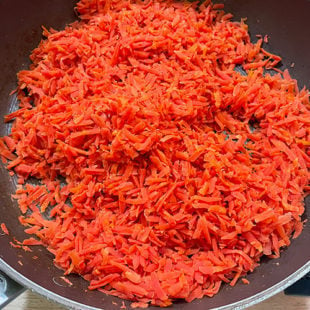
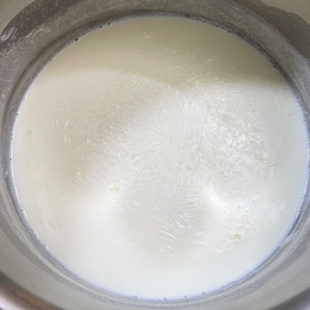
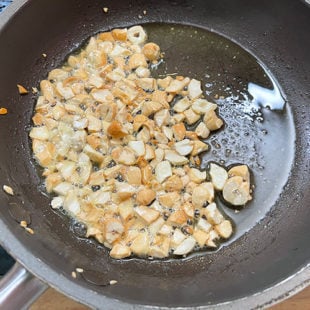
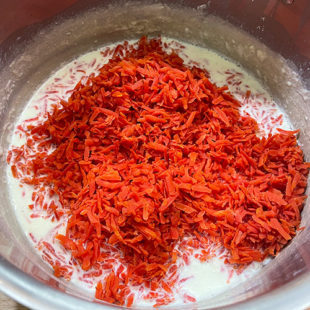
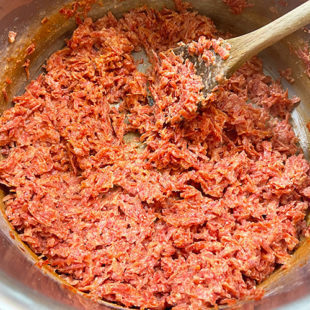
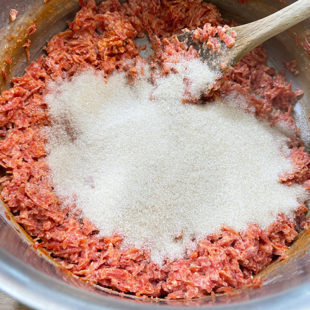
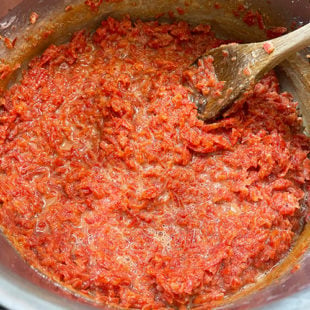
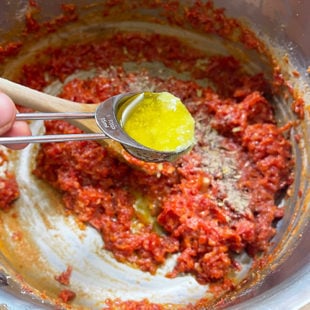
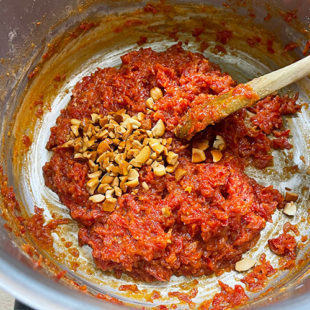
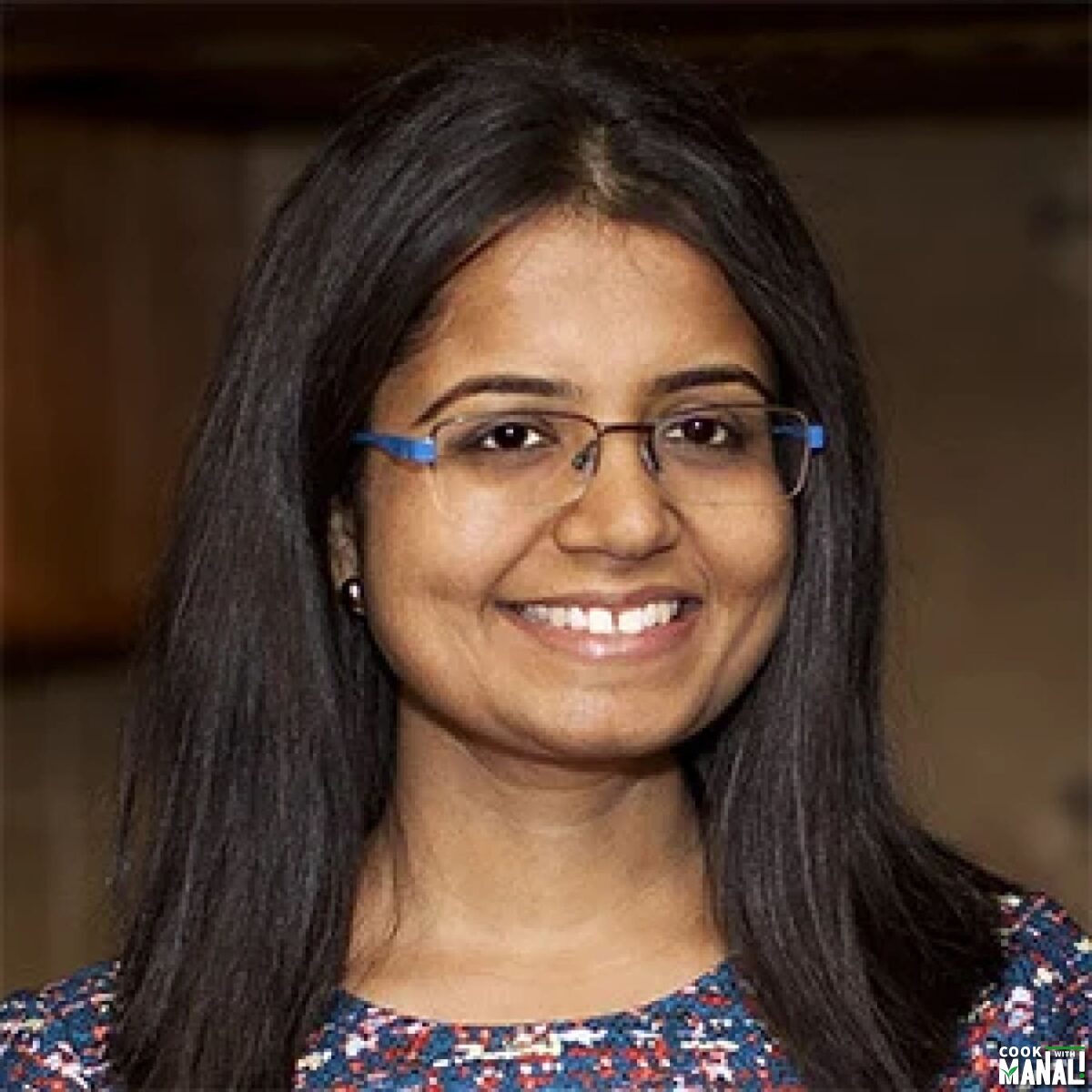
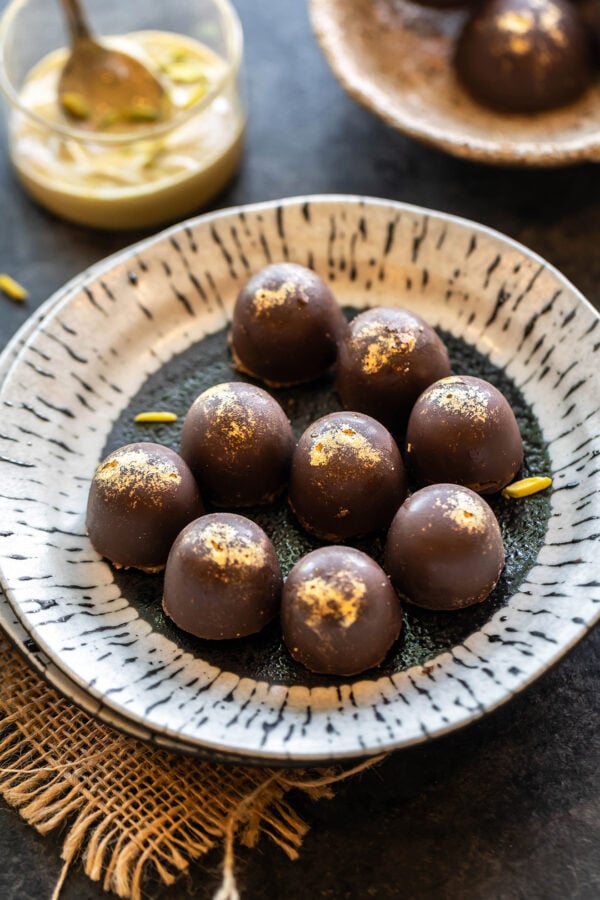
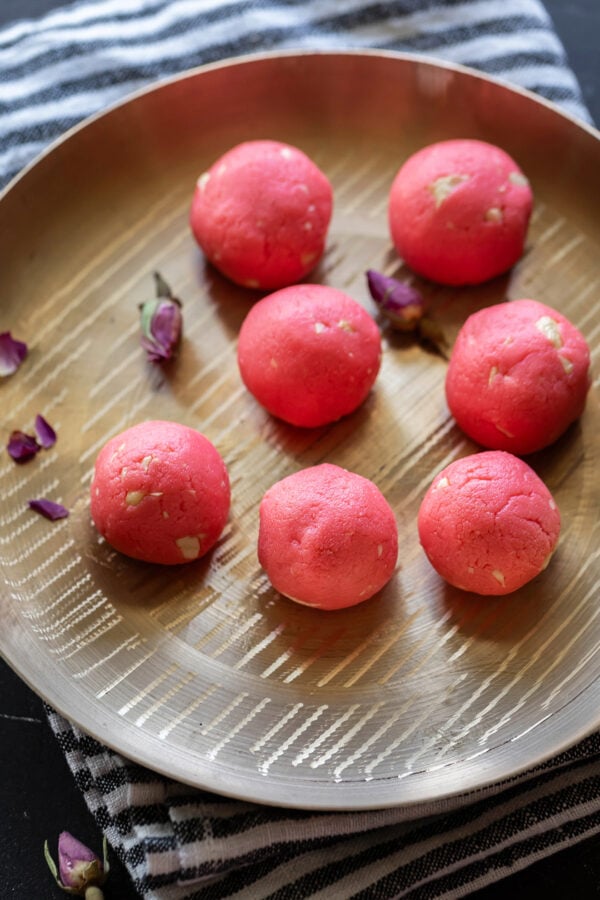
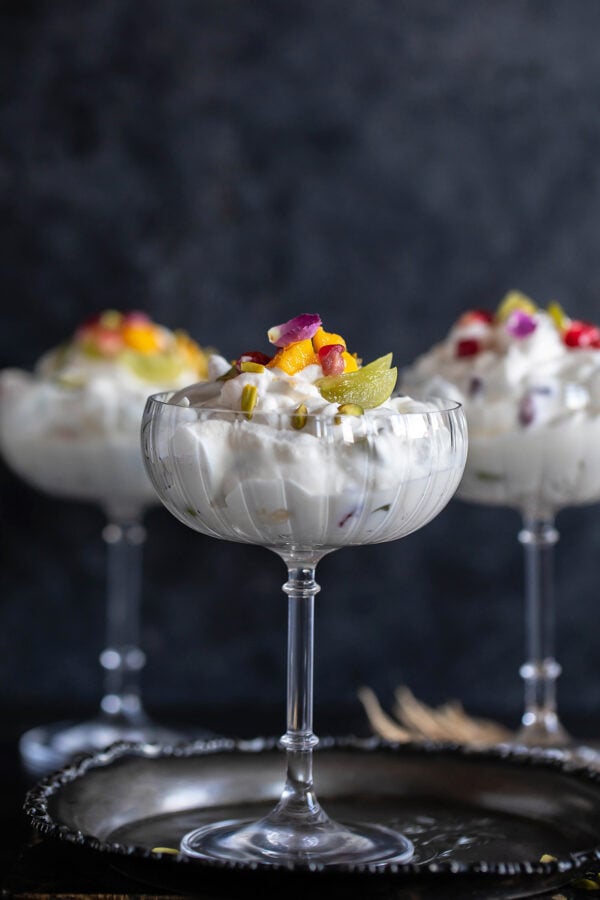
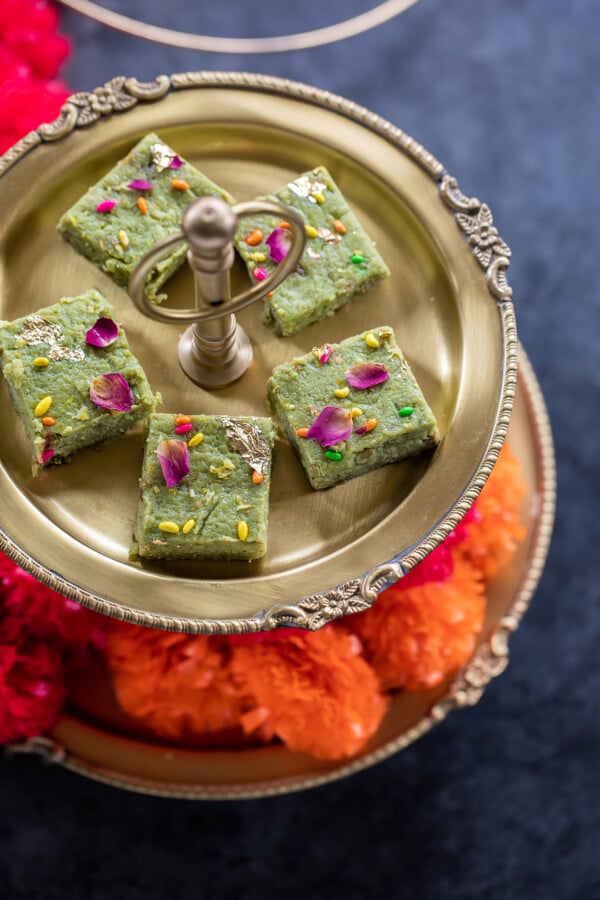









Manali, I finally found these Cal organic red carrots from Sprouts store and I am excited to try your recipe. However, I wanted to ask you if the halwa can be freezed after cooking it entirely or after semi-cooking it? I want to serve it at a party in april but carrots are available right now in Jan so I bought them now. Please advise.
Hi Prachi! You can freeze it, I would cook until done, maybe skip the ghee part, then let cool complete and freeze. Thaw in a pan, I would do the step of roasting in ghee later when I want to serve it. I hope that works. Honestly I have never tried freezing this halwa but that’s how I would do.
Wonderful and easy-to-follow recipe. I like how the author explains the texture of the halwa at each point in the cooking procedure (e.g. milk solids when the carrots have absorbed the milk, liquid-y consistency after adding sugar, etc.). I did not have a large grater, so I used the small grater I had with finer grates, but it still turns out pretty good and not mushy. Ran out of ghee, so I used butter and the taste was fine. I’ll add ghee the next time I make it to see if that adds more flavour (it probably will!). Thanks for the recipe, Manali.
Thanks for trying Sukanya! Glad you enjoyed it!
How do fix extra sweet halwa?
I would saute some carrots in ghee and add it to the halwa and then let is cook for 15 minutes or so on low so that the flavors can come together again
Loved this . It was really delicious
glad to know Manjusha!
I just tried this recipe and the halwa came out great! I used the food processor instead of grating, but no change to the texture. I used a little more ghee than in the recipe for the glaze… the recipe is a keeper
So made the halva today and wow it tastes amazing. Fantastic recipe, i even sent some to my mother in law. Me and my daughter had it with ice cream. Thank you xx
glad to know!
I have not tried your recipe yet. I may have to use a food processor to cut up the carrots. I am physically handicapped and will not be able to stir the pot for very long. Is there any way that this can be cooked in a crock pot? If so, about how long? We have moved and I do miss our wonderful Shalamar Restaurant in Louisville, KY. Thank you.
you can use food processor. Sorry I don’t have a crockpot recipe, but I do have a Instant Pot recipe for this one: https://www.cookwithmanali.com/instant-pot-gajar-halwa/
Awesome recipe, the step by step pics really helped! Thanks so much, I was able to make Gajar Halwa for the first time.
I am so glad to hear that!
I am so excited to have finally found this recipe!! I went to India with my brother, and his coworkers family presented this dessert to us at the end of the most amazing meal I’ve ever had. It was so lovely, and I am still missing it two years later! I’m going out to search for red carrots today!! =)
Hope you get to make it! 🙂
I made this following the recipe & it was absolutely 😋 delicious! I made it for my friends that came over on the weekend & they couldn’t get enough of it.
Thank you
so glad to know Naeem!
Hi Manali ji,
Awesome recipe I tried ,came out perfect and recipe is stuck in my head .
Can I substitute with jaggery?
you may!
Manali ji! Wow, this is an excellent recipe. Tastes like home. 😀 I found red carrots in an Indian shop and bought the last kg–pricey, but totally worth it for this!
My only suggestion would be to increase the total time. It took me 2h20min as it does take time to grate the carrots and properly dry fry all of them (had to do two batches as they would have filled half the pot). Otherwise, your directions are excellent (as usual). Happy Diwali to you and your family!
I broke all the rules, but the halwa still came out tasting better than what you get at restaurants and what I have made before.
* Used baby instead of red carrots
* Used food processor instead of grating by hand
* Used 2% instead of whole milk
* Used only 1 tbsp ghee and added only 1 tsp during roasting. To prevent burning and sticking I stirred continuously in the last 8 minutes
I am sure it would taste even better if I followed all the rules. Fantastic recipe!
absolutely! 🙂
Thank you so much Manali 🙂 can we freeze this gajar halwa? Would love to see your pantry and kitchen tools too.
yes it should freeze well! I would try to do a kitchen and pantry tool post someday 🙂
What food processor you use in your kitchen ?
a small one from kitchen aid and a bigger one from Hamilton beach
Thanks Savita! I had to make gajrela, was craving for it badly!
Thanks Karishma! It’s one of my favs too! 🙂 Wish you a fab 2015!
haha you are just like me then Jen! Yes relaxing at home is the way to go! Thanks for the pin!
Thanks Angie! Wish you a fantastic 2015!
Thanks Mira! Yes for a fitter 2015!
Happy New Year Manali!! You’re definitely starting 2015 very well. I never heard about indian carrot pudding before. It sounds interesting and delicious. Pinned!
Thank you Oriana! Wish you a fantastic 2015!
Happy New Year Manali! This dessert looks duper delicious! I love the vibrant colour & flavours so much!
To you too Jessica! 🙂 and thank you!
Wish you the same Thalia! 🙂 Making halwa is easy, you should give it a try!
Hi Manali! Happy 2015! Gajar Halwa was one of the first Indian desserts I tasted and I loved it. I made my own version of it, without ghee because it’s kind of impossible to find it here
Wish you the same Azu! Oh yes unsalted butter works as well…you can try to find ghee in Indian grocery stores. In fact I now find it in American grocery stores as well! Gajar Halwa is one of my absolute favorites too! 🙂